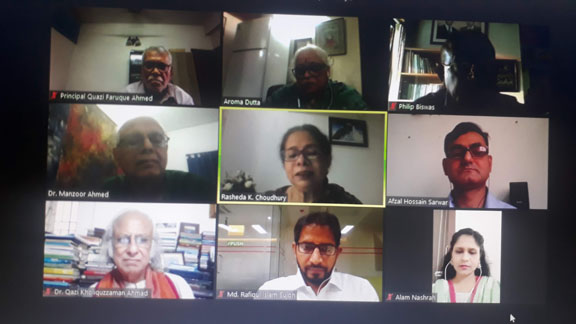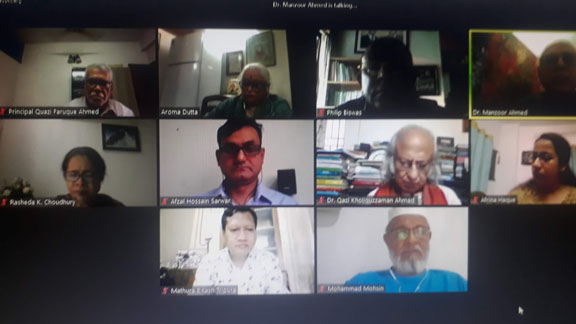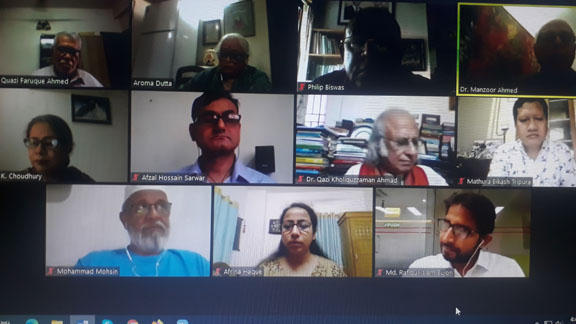Shikkha Shonglap on Prospects and Challenges of Distance Learning during COVID-19
CAMPE organized the 1st Episode of ”Shikkha Shonglap” on Prospects and Challenges of Distance Learning during COVID-19 on 27 October 2020 for emphasizing on protecting right to education, addressing trauma and continuity of education through distance learning.
Dr. Qazi Kholiquzzaman Ahmad, Hon’ble Chairman of the Palli Karma-Sahayak Foundation (PKSF) & Chairperson of Education Watch and Aroma Dutta, MP graced the occasion as Guests of Honor.
Mr. Afzal Hossain Sarwar, Policy Specialist (Educational Innovation) & Mr. Mohammed Rafiqul Islam, Educational Technology Expert of the Access to Information (a2i) project of the Prime Minister’s Office were Key Note Presenters and Mr. Mohammad Mohsin, ECD Specialist of UNICEF was the designated discussant at the session.
Other distinguished discussants included Ms. Rasheda K. Choudhury, Executive Director of CAMPE and Former Adviser to the Caretaker Government, Principal Quazi Faruque Ahmed, Teachers Leader and Member of the NEP 2010, Mr. Philip Biswas, Executive Director, Rural Reconstruction Foundation (RRF), Jashore, Dr. M Ehsanur Rahman, Executive Director, Dhaka Ahsania Mission, Mr. Mathura Bikash Tripura, Executive Director Zabarang Kallyan Samity, Khagrachary and Mr. Md. Jahangir Alam, Thematic Expert, Centre for Disability and Development (CDD). The session was chaired and moderated by Dr. Manzoor Ahmed, Vice Chairperson ofCAMPE.
The major objective of the session was to explore the opportunities and challenges of distance learning and to identify priority actions. The importance of Online and Distance Education for addressing learning continuity and trauma during Covid-19 became major discussion points at the shonglap.
The meeting started with a welcome note from the Executive Director of CAMPE. At the beginning of the meeting, the participants held one minute silence for paying homage to the eminent educators, CSO leaders and many other allies who lost their lives because COVID-19.
A total of 70 participants including representatives of CAMPE’s member organizations, INGO Forum, selected teacher associations, media and members of the Education Watch Group actively participated and provided their feedback at the Consultation.
Major observation/comments from the guests and participants included the following:
• Ministry of Education and Ministry of Primary and Mass Education, in cooperation with A2i and ELCG has taken important initiatives for promoting distance learning through national TV channel, Internet, mobile phone and community radio;
• However, the online affords have reached only 30% students, who are from the upper strata of society which may increase inequality;
• In future distance learning must be complementary and a mixed system of face to face learning and distance learning will be required to reach the most marginalized;
• It is essential to rethink our examination system and engage the teachers in the assessment/examination planning process;
• The current crisis will have long-lasting consequences for our education system in terms of access, quality, equity and management. Besides, this unprecedented period has laid bare inequalities everywhere particularly in access to learning for multiple and inter-related reasons, from socio-economic disadvantage to digital exclusion which will be stumbling blocks to fulfill the achievement of national commitment particularly for SDG4/Education2030 agenda;
• It will be necessary to decentralize the planning and management of our primary and secondary education system in each upazila involving local government, CSOs and local communities. A special allocation of Taka five to ten crore (50 to100 Million) on average for each upazila, pro-rated by student population, may be allocated to support students through individual school-based plans;
• It is essential to rethink post-crisis ‘new normal’ in terms of mitigation, recovery, quality-equity focus with better use and integration of ICT. Better support to teachers and reform of student assessment, strengthening non-formal and second-chance education involving research institutions and NGOs should be considered;
• It will be necessary to ensure supply of uninterrupted electricity, internet and affordable devices and data for all learners to maximize the benefits of online and distance learning facilities;
• Government of Bangladesh needs to consider reducing the variation of education delivery mechanisms and nationalize the entire education sector in phases. Teachers’ career development will be critical for job satisfaction. Continuous professional development of teachers should be considered as an integral part of the initiative;
• Adequate investment in education and its judicious use particularly for improving quality of education will be essential;
• Finally, the observations and recommendations forwarded by the participants at the Shikkha Shonglap should be brought to the notice of the Ministers of Education and Minister of Primary and Mass Education and should be discussed with the concern Parliamentary Standing Committees.
To download, the presentation please click here:



